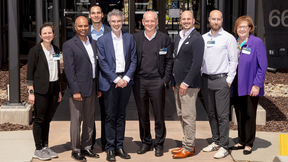DOE announces additional funding for HPC4Energy Innovation projects
 (Download Image)
(Download Image)
Under a collaboration funded by the Department of Energy’s High Performance Computing for Energy Innovation initiative, Lawrence Livermore National Laboratory and Vulcan Materials Company will use supercomputing to optimize the asphalt mixing process to reduce carbon intensity, improve production quality and reduce environmental emissions from asphalt plants. Pictured is the Vulcan Materials Company hot mix asphalt plant in Fresno, CA. Photo courtesy of Vulcan Materials Company.
The Department of Energy (DOE) today announced $3.9 million for 13 public-private partnerships that will apply high performance computing (HPC) to manufacturing processes and advanced materials, including a Lawrence Livermore National Laboratory (LLNL) collaboration to decarbonize asphalt production.
The awards, representing DOE’s fall 2022 round of funding for the High Performance Computing for Energy Innovation (HPC4EI) initiative, focus on topic areas associated with HPC4EI’s HPC4Manufacturing (HPC4Mfg) and HPC4Materials (HPC4Mtls) programs, which are managed by LLNL for DOE’s Office of Energy Efficiency and Renewable Energy (EERE) and the Office of Fossil Energy and Carbon Management (FECM).
The funding includes $300,000 for a partnership between LLNL and construction aggregate producer Vulcan Materials Company to optimize heating in the asphalt mixing process to reduce carbon intensity, improve production quality and reduce environmental emissions from asphalt plants.
Optimizing the heating process and removing carbon-based fuel combustion as a heat source will result in an annual national energy savings of 26 million gigajoules per year and reduce emitted CO2 by 8 million metric tons per year, according to an LLNL analysis.
Supported by DOE/EERE’s Advanced Materials and Manufacturing Technologies Office (AMMTO) and Industrial Efficiency and Decarbonization Office (IEDO), the HPC4Mfg program is funding eight of these 13 projects to improve manufacturing processes, reduce carbon emissions and save energy by employing DOE HPC expertise and resources.
Besides the LLNL/Vulcan Materials collaboration, other projects within this round of selections include using HPC to improve manufacturing processes of fuselages for open-rotor engines, bioreactors, hydrogen-combustion controls for engines, superalloys, battery electrode drying, lithium-ion batteries, solid electrolyte interphases and acrylics.
Four projects were funded under the HPC4Mtls program by FECM. Projects include efforts to improve resilience in pipeline infrastructure, carbon capture and sequestration in turboexpander units, optimizing CO2 reduction in electrocatalysts and applying artificial intelligence to high-hydrogen combustors to eliminate CO2 emissions in the power sector.
One project to enhance additive manufacturing of ceramics will be co-funded by the HPC4Mtls and HPC4Mfg programs. Each project will receive up to $300,000 in federal funding; industry partners are required to fund at least 20% of the total project costs.
Participating DOE national laboratories include LLNL, Oak Ridge National Laboratory, National Energy Technology Laboratory, National Renewable Energy Laboratory, Argonne National Laboratory, Lawrence Berkeley National Laboratory and the Pacific Northwest National Laboratory.
Contact
 Jeremy Thomas
Jeremy Thomas
[email protected]
(925) 422-5539
Related Links
High Performance Computing for Energy Innovation (HPC4EI)Advanced Materials and Manufacturing Technologies Office
Industrial Efficiency and Decarbonization Office (IEDO)
HPC4 Energy Innovation Site
Tags
ASCHPC, Simulation, and Data Science
Computing
HPC Innovation Center
Energy
Featured Articles







